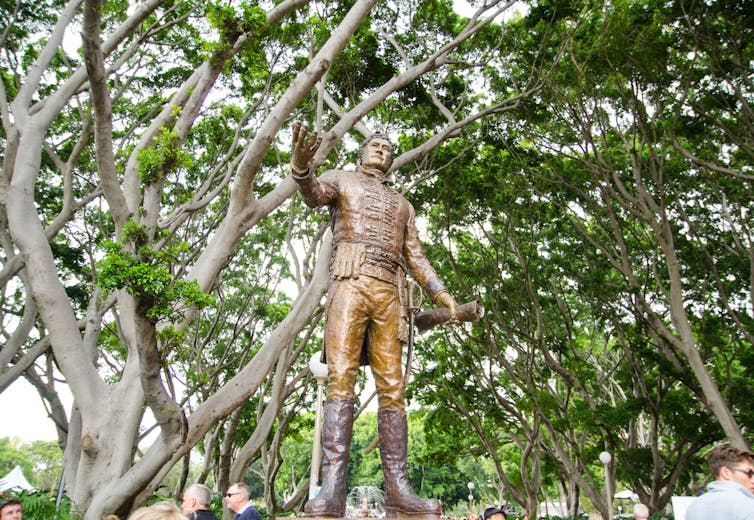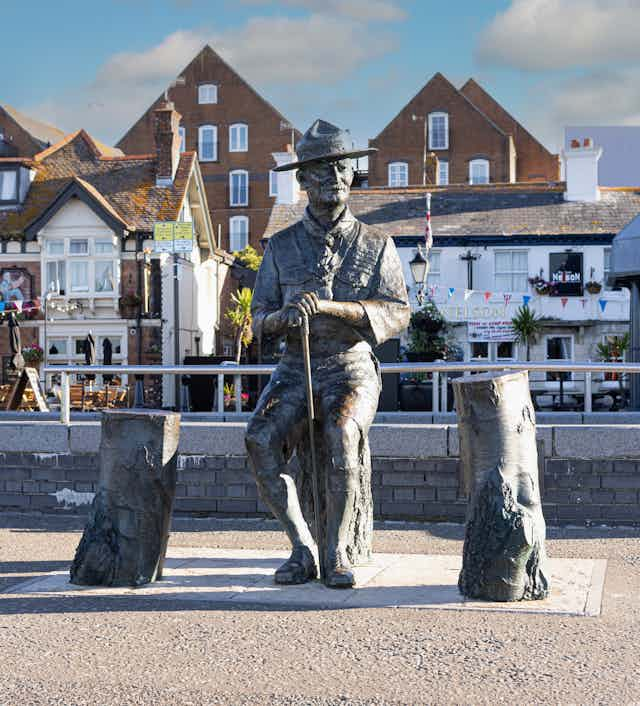Scouts Australia is considering changing the name of its most prestigious youth award, the Baden-Powell Scout Award.
Presented to recipients by the governor-general, this award is named after the movement’s founder, Lord Robert Baden-Powell, fondly known as B-P.
For millions, Baden-Powell remains a hero. For others, his role in creating the largest youth movement in history is overshadowed by allegations of colonial war crimes.
Like Macquarie University, the City of Sydney, and other institutions, Scouts is caught in an awkward gap between tradition and modernity, as society grapples with colonial figures who were heroes to some, but not others.
Read more: What history tells us about Boy Scouts and inclusion
Adapting to changing social values
Scouts is one of Australia’s largest youth organisations, with over 70,000 members.
Globally, the movement has 57 million members and volunteers across 174 national organisations.
Baden-Powell’s handbook, Scouting for Boys, is the fourth best-selling book of the 20th century.
The movement began in 1907 after Baden-Powell coordinated a camp on Brownsea Island, England. Baden-Powell’s Scouting philosophy emphasised social responsibility and outdoor skills. The movement became a global sensation, arriving in Australia in 1908.
Notwithstanding its positive influence in fostering youth life skills, the early Scouting movement arguably sometimes operated as an agent of British colonialism. In the early 20th century, it spread across distant outposts of the British Empire, where it encouraged imperial loyalty.
Scouting has endured for over a century, in part because of its willingness to adapt to changing social values.
In 1973, Scouts Australia first admitted women. In 2018, Scouts Australia altered the wording of the Scout Promise.
Now, a Scout can decide between swearing to “do their duty” to their king or queen, or their community and world, and can pledge to their “spiritual beliefs” or “their God”.
But back to Baden-Powell
Scouts Australia is “reviewing the appropriateness of the Baden-Powell Scout Award name”.
In part, this has been prompted by overseas events. In 2020, amid Black Lives Matter demonstrations, a statue of Baden-Powell in England appeared on a “Topple the Racists” hit list.
Yet, the statue was defended by local Scouts, and a petition against its removal received over 40,500 signatures.
Controversy around Baden-Powell stems from allegations he held antisemitic and racist attitudes.
In 2010, declassified M15 files showed Baden-Powell had been invited to meet Adolf Hitler to build closer ties between Scouts and Hitler’s youth organisation.
Historians have since argued Baden-Powell has been incorrectly framed as a Nazi sympathiser. The meeting never eventuated, and Scouting was banned in Germany, with Baden-Powell being placed on a Nazi death list.
Before Scouts, Baden-Powell was already a hero of the British Empire for his efforts during the South African War.
This conflict claimed the lives of thousands of Black Africans. As an army officer, Baden-Powell famously defended the town of Mafeking, becoming an overnight hero to the British.
Yet, Baden-Powell has since been accused of war crimes against local Africans, including unlawful executions and contributing to starvation. Historians contest the extent to which Baden-Powell ought to be blamed.
Regardless, as an agent of empire, Baden-Powell cannot be extricated from the legacy of British colonialism in Africa. Globally, Scouts has recognised this, with the Chief Scout of the UK, Bear Grylls, admitting Baden-Powell’s “failings”.
An extended process of public reckoning
Scouts is just one of many organisations forced to reckon with their colonial baggage.
Often, colonial origin stories are commemorated through the names of places or institutions.
Anyone driving across Australia today will still see reminders of our colonial past in racist naming practices that glorify certain legacies over others, or spread a distorted version of history. The case to replace obviously racist place names can be uncontroversial, provided consultation takes place with Traditional Owners.
In recent years, Queensland has revoked certain racist place names, while Tasmania has renamed several places that previously commemorated colonial violence.
However, some cases can become fraught.
Examples include the many entities that derive their name from Lachlan Macquarie, who served as New South Wales governor from 1810 to 1821. He has been celebrated as a humanitarian, yet Macquarie terrorised local Indigenous peoples.
His military carried out the Appin Massacre of 1816. Macquarie ordered the victims’ bodies to be strung from trees as a warning against further resistance.
Today, Macquarie’s legacy is increasingly disputed. This year, a statue of Macquarie was defaced, with graffiti exposing his record of violence.
Even Macquarie University is facing calls to recognise his ambiguous legacy, rather than promoting him.

In Hyde Park, a plaque beneath a statue of Macquarie describes him as “a perfect gentleman”.
Yet the City of Sydney has recently announced a review of 25 colonial statues, with an aim to include new signage that presents a fuller picture of history.
This is likely to be the start of an extended process of public reckoning. This may extend from relatively unknown statues, or place names, to big businesses and institutions with connections to questionable legacies.

